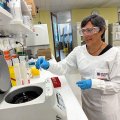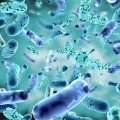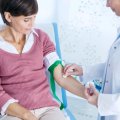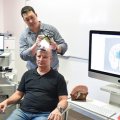Research designed to help patients with cancer, schizophrenia, stroke and depression features among projects that were today awarded new funding at The University of Queensland.
Eighteen UQ medical researchers were awarded fellowships, as part of the $50.3 million National Health and Medical Research Council granted to UQ, from a total of $89.2 million awarded to seven Queensland research institutions, and $559 million awarded nationally.
Of the 85 UQ research projects that won NHMRC funding, four grants exceeded $1 million:
- $1.3 million to a UQ Queensland Brain Institute schizophrenia research project led by Professor Bryan Mowry
- $1.2 million to research led by UQ Communications Disability Centre co-director Professor Linda Worrall to investigate preventing depression and reducing the impact of aphasia language disorder in stroke patients and their caregivers
- $1.1 million for a squamous cancer research project led by Translational Research Institute CEO and Research Director Professor Ian Frazer
- $1 million to schizophrenia research led by Associate Professor Helen Cooper of the Queensland Brain Institute
UQ President and Vice-Chancellor Professor Peter Høj, and Deputy Vice-Chancellor (Research) Professor Max Lu, congratulated the funding recipients and wished them the greatest success for their projects.
“These researchers have the proven potential to improve the health of Australians and people worldwide, and to develop the knowledge to inform more effective national and state policies for health and other areas,” Professor Høj said.
“To understand the kind of outcomes they can achieve, consider that UQ’s many outstanding recipients of NHMRC funding include Professor Ian Frazer and Dr Ryan Taft.
“Professor Frazer co-invented the human papillomavirus vaccine that could save a quarter of a million lives each year.
“Dr Taft discovered a previously unknown disease in a little Melbourne boy, Massimo Damiani, featured on ABC-TV’s Australian Story this week.”
Professor Lu said better health outcomes were the primary reason for high-calibre health and medical research, but there were clear economic benefits too.
“Health and medical research funding is a vital public investment because it not only benefits the well-being of our society, but can also have positive downstream effects on exports, business growth, international investment attraction – and much more,” Professor Lu said.
Nine UQ researchers won Research Fellowships, at values ranging between $600,000 and $822,000. These new fellows include Professor Matthew Cooper and Professor Peter Koopman from UQ’s Institute for Molecular Bioscience, and Dr Katryn Stacey from the UQ School of Chemistry and Molecular Biosciences.
Three UQ researchers were awarded Career Development Fellowships in today’s announcements, each worth more than $400,000.
Five UQ researchers won Early Career Fellowships, each worth just over $300,000.
One researcher, Dr Megan Auld, won a Translating Research into Practice Fellowship, valued at $170,689.
UQ’s Professor Beate Escher, from the National Research Centre for Environmental Toxicology, won a $252,000 European Collaborative Research Grant for her collaborative international research project that is seeking solutions for emerging pollutants in land and water resources management.
Today’s overall NHMRC announcements supported 963 grants across three NHMRC research support schemes and five fellowship schemes.
UQ’s $50.3 million funding package was the fourth largest nationally, alongside other top national universities including University of Melbourne ($79.4m), Monash University ($67.2 m) and University of Sydney ($60.5m).
UQ’s 22 per cent success rate for NHMRC Project Grants – against the number of applications lodged – led the Group of Eight Universities, and exceeded the national average success rate of 16.9 per cent.
Australia is among the top five countries in the world in producing scientific articles per capita and in the past decade alone, Australia’s health and medical research sector has produced three Nobel Prize winners.
Contact: Nicole Shively, UQ Research Grants office, ph +61 7 3365 3571, or Carolyn Varley, UQ Communications, ph +61 7 3365 1120.
.jpg)











